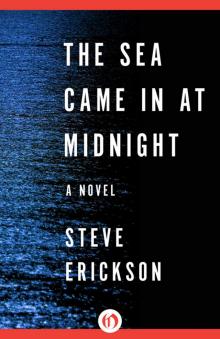- Home
- Steve Erickson
ARC D’X Page 2
ARC D’X Read online
Page 2
“We’re on the boat,” Sally answered.
“I want to go home,” the little girl said. She looked around her. “It’s dark.”
“I know. It’s night.”
“I want to go home.”
“Well, we’re going to see your father and your sister,” Sally finally brought herself to say.
“I don’t want to go to France!” Polly cried. She jumped up from the bunk and ran to the door of the cabin, flinging it open as the night sea sprayed her face. She looked up at the mast of the ship swaying in the dark above her. Sally tried to pull her from the door but Polly pushed her away. “You tricked me,” she screamed at the older one.
“Yes,” Sally admitted.
“I order you to make the ship go back. You have to. You’re a slave and I’m a Virginian.”
Sally walked across the dark cabin to close the door. By the bed she lit a lantern. “This isn’t Virginia,” she said, “this is the ocean.” She sat back down on the bed. “I’m sorry we tricked you. It wasn’t how they wanted to do it. They never wanted to send you away at all, it’s what your father wants. I didn’t want to go either.” Sally folded her hands in her lap and looked off into the corner, thinking of her brother James. “My mother’s not too happy about it.”
Polly didn’t care in the least about Sally’s mother. “You tricked me,” she repeated bitterly.
“I know,” Sally said.
As the ship crossed the Atlantic, however, Polly reconciled herself to the adventure. They sailed not to France but England, where Thomas was supposed to meet Polly in London and take her on to Paris himself. Sally, it was understood, would immediately return to America. But at the rue d’X it had become apparent to Thomas, over the course of the month, that a rare opportunity to see his lover Maria was about to present itself. When Polly and Sally got to London, Polly’s father wasn’t there to greet them. This left the little girl even more nonplussed; so, as well, were the American couple in London whom Thomas had alerted to take Polly in. After a few days, just as Sally was about to embark back to Virginia, word came from Thomas that he wouldn’t be traveling to London at all and the American couple were to send Polly along to Paris in the company of whoever had come with her to England. On general principles Polly threw the most spectacular fit of her eight-year life, though she was secretly pleased that Sally would be staying. The American woman, Abigail, was appalled. “It won’t do,” she said to her husband John one night, “that girl’s got to go back home on the next ship.”
John pretended to misunderstand. “She hasn’t seen her father in over two years,” he answered. “He should have come to London to meet her though. Inexcusable.”
“I’m not talking about Polly,” Abigail said impatiently, “I’m talking about the other one.” She didn’t look at her husband. “She’s rather useless. Why they sent her instead of an older woman—”
“I think they explained that,” John cut her off. John cut off people all the time, but he never cut off Abigail; they both realized it at once. “It was the only way they could lure Polly onto the boat. She was the only one who could have gotten Polly across the ocean at all. Give her that, at least.” He shrugged. “She’s not an unpleasant girl.”
“What do you mean,” said Abigail.
“I mean she’s not an unpleasant girl.”
“Don’t be disingenuous with me.”
“What the hell—”
“You know what he’s been like since his wife died,” she said quietly. “All those stories about his carryings-on in Paris—”
“Political enemies—”
“Yes, I know,” she said, “and I don’t doubt his enemies make it all much worse than it is. Listen, I think the world of him. I believe I’m closer to him than you are at this point. I’ve always thought there was something of the saint about Thomas—”
“Well,” John began to protest, “I don’t—”
“Yes, well, you two have had your differences lately. That’s politics, and I defer to you on politics. But I’m talking now about Thomas’ passions.”
“Do you suppose Thomas has passions?”
She was astounded. “Do you suppose he doesn’t?”
“I’ve never thought of him as a passionate man.”
Abigail stood in the doorway of the study looking down the hall, past the stairs, to the back quarters where the slavegirl named Sally slept. She folded her arms. “Thomas is the most passionate man I know,” she said into the dark of the hallway. When John didn’t answer, Abigail said, “She shouldn’t go to Paris.” She wanted to ask her husband if he thought Sally was beautiful, but it was a foolish question. The answer was obvious, and whether he told her the truth or a lie it was bound to hurt.
“She’s only a girl,” John finally said after an uncomfortable interval.
“She shouldn’t go to Paris.”
They did not know her. The city did not know Sally on the drizzling autumn day the coach delivered her, along with Polly to the rue d’X; the street did not know her when Patsy dashed from the Hotel Langeac into the rain and mud to sweep her baffled little sister up in her arms. “But who are you?” Patsy finally turned to ask Sally amidst the family reunion, as the slavegirl lingered before the fire in the hotel’s front room; and Sally answered, “It’s me, miss.” They had spent many afternoons playing together in Virginia. “Father,” Patsy said, looking at Sally from head to foot in consternation, “it’s Betty Hemings’ little girl!” On the stairs Thomas stood with an elegant young Englishwoman and a black man who Sally realized, after some moments, was her brother; they all regarded her with troubled curiosity. “But why did they send someone so young with Polly?” Patsy asked, though in fact Patsy was only a year older than Sally, and it was Sally who looked like a woman. “Isn’t it odd?”
“She tricked me,” Polly exclaimed petulantly. It was the first thing she’d said.
“Yes, I’m afraid so,” Sally said. James stood at her side, studying his hands nervously. “Miss Polly wasn’t at all keen on making the passage. They decided I was the only one who could get her onto the ship.”
“It was a shrewd maneuver then,” said Thomas.
“It was a bloody trick!” the eight-year-old cried.
“Don’t say that word,” Thomas admonished, “obviously you spent too much time in England.” He disappeared up the stairs with his daughters. James followed in silence with the bags. Sally stood shivering in the foyer as the other woman remained on the stairs watching her. “I’m sure,” the woman finally said, “it would be all right with Mr. Jefferson if you wish to warm yourself for a moment by the fire. Then your brother will show you your quarters.” The woman left and Sally was completely alone for what seemed a long time. She realized it was longer than she’d ever been alone. No one else was in the hotel foyer; the only sound was the crackling of the fire and some footsteps upstairs, and the flow and ebb of the din from the streets. She could hear the voices of passersby outside speaking words she didn’t understand. This isn’t Virginia, this is the ocean, she’d said to Polly on the boat. She looked at the door of the hotel and had a thought she’d never had before; she so terrified herself by it that she immediately left the fire and went upstairs, where she found her quarters across the hall from James’.
It was a tiny room but it was her own. There was a wooden bed with posts; at night she’d take the long blue ribbon from her raven hair and tie it to the post above her head. She’d shake her hair loose and let it cover her bare shoulders. High above the bed was a small window in the shape of a crescent moon, and through it came the light of torches in the middle of the night and the angry tumult of growing mobs.
Sally was shocked when James later explained that the woman on the stairs was the master’s lover. “But don’t you remember,” Sally said to her brother, “he promised his wife he’d never marry again,” and James answered, “He’ll keep that promise. Mrs. Cosway is already married.” Sally saw the woman twice more. Two days after arriving in
Paris she served the couple breakfast. Both Thomas and Maria were lost in their thoughts, staring silently out the window of their suite at the ceaseless rain: he appeared too depressed to eat and she, regarding Sally once, lowered her eyes and never looked back up. But just as Sally was about to leave Thomas asked what she could tell him of Virginia, and so the nearly dumbstruck fourteen-year-old sat in the suite for the next hour trying to update him on what had happened since he’d left. The more she talked and answered his eager questions, the more evident was his wistfulness for home and the more Maria seemed to wilt beside him. For the rest of the day Sally was ecstatic at how she’d raised his spirits.
Then one afternoon a week later, coming up the street after taking Polly for a walk, Sally saw a coach in front of the hotel being loaded with luggage. Thomas and Maria stood together in the hotel door. Both of them looked very unhappy. They held each other’s hands and said nothing; as she turned to the coach, he was ashen. Several feet from the carriage she stopped for a moment and he raised his arms as though expecting her to come back. But Maria boarded the coach staring straight before her; and Thomas, more crestfallen than Sally had seen him since his wife’s death, whirled around and disappeared into the hotel.
The headaches began after that. They were worse than any he’d had since that terrible summer five years before. As then, he hid in the dark of his room, only occasionally receiving the visitors who arrived every day in an endless stream. Through the double doors Sally could hear their monologues punctuated by pauses in which Thomas’ whisper was barely discernible. Sally would close the hallway windows to shut out the sound of the crowds who gathered every day in the streets, listening to speeches. “Why are you closing the windows,” Patsy said to her one unseasonably warm afternoon.
“I thought your father would appreciate the silence,” Sally answered.
Both girls were immediately struck that she’d called Thomas “your father” rather than “the master.” A moment passed before Patsy said, “Perhaps for a while, until things outside calm down.”
Mortified by her faux pas, Sally could only mutter, “Paris is an excitable place.” Outside it did not calm down. The afternoon grew more volatile and Thomas remained in his sanctuary, emerging each afternoon only to ask if a letter had arrived from Maria in London, then vanishing back into the dark. Finally Sally summoned all her courage and early one evening entered Thomas’ room. She brought some cold rags as she’d seen her mother do in Virginia. She carried them in a smooth peach-colored porcelain bowl. Thomas was lying back in a chair that reclined. Sally waited in one place for several minutes and, her courage slipping, was about to leave when Thomas looked up. “Who is it?” he said.
Am I so black, Sally asked herself, that he doesn’t know me in the dark? “It’s Sally, sir.”
“Sally.”
“I have some cold cloths for your head, if you’d like.”
“Yes,” Thomas whispered after a bit. He said, “Sometimes I think the pain’s about to leave, but midday it returns.”
Midday, she thought, when he hopes for word from her. Thomas lay back in the chair. Sally set the bowl down on the desk beside him. She wrung the excess water from the rags; she squeezed the rags over and over until her hands were red. Nothing would be so appalling as to put the rags on his head and have a drop of cold water run down his face. Her hands shook badly as she held the rags above his forehead; she had to set them down for a moment and collect herself. His eyes remained closed, waiting.
She was aware of someone behind her. She turned and Patsy was in the doorway. Without meeting Sally’s eyes, Patsy came and silently took the rags from Sally’s hands. Thomas didn’t stir. Patsy placed the cold rags on her father’s head; she never looked at Sally or spoke. Sally bowed her head slightly and left the room.
Thomas lay in the chair and felt her hands on his head. He was having a vision of the King of France hanging by the neck from an archway in Versailles. It wasn’t an unpleasant vision, though in all truthfulness Thomas found the king an amiable fellow, perhaps even well-meaning in a weak and ultimately pointless way. But there he was, nonetheless, dangling from the rafters of Thomas’ mind; when Thomas himself actually felt the wind blow through the king’s hair, he realized the slavegirl was stroking his brow. After a while he opened his eyes and saw, quite unexpectedly, his daughter. “Oh,” he said.
Patsy sat down in the next chair. “How is it?”
“It comes and goes,” Thomas said, “I was telling—” He stopped. “It comes midday, and then goes.” He pulled the cold rags from his forehead down over his eyes. He’d recently come to talk about things with Patsy the same way he used to talk with his wife, but Maria wasn’t something he could talk to her about. “It will eventually pass,” he said. “As it always has before.”
“Father,” Patsy finally said, “what about James and Sally?”
“James and Sally?” he said.
“How long will they stay in Paris?”
Thomas lay back in the chair, his eyes closed again. Patsy found this disconcerting. It was like her father to be private, but not evasive.
“As long as it’s…” He shrugged. “Helpful.”
“I would think you might want to send them back to America soon.”
“Why? It’s a dangerous voyage this time of year. We certainly could use them here, especially now that Polly’s with us. It seemed to me you and Sally were friends once.”
“We were little girls, father. When some things didn’t matter.”
“What things?”
“Do James and Sally know they aren’t slaves in Paris?”
Thomas sat up. He pulled the rags from his eyes and looked troubled. “I don’t know,” he said. “I would think James will figure it out if he hasn’t already.”
“And then he will tell Sally.”
“Yes.”
“Do you ever think of telling them?”
“Yes.”
“Will you?”
“I don’t know.”
Patsy asked, “Doesn’t it still trouble you? It used to trouble you. I mean, the slaves.”
“Yes.”
“Everyone here says it’s rather dreadful.”
“They’re right. It’s rather dreadful.”
“So why—?”
“Because we’re weak,” he answered, before she could ask.
That night Thomas dreamed about the hanging man. He hung from a beam just below the pain in Thomas’ head, not in the king’s palace but a bare room of empty shelves and tattered deep-blue curtains. The hanging man was gaunt and old, not at all like the king; it wasn’t long before Thomas realized it wasn’t the king but himself, hanging in the study of his home in Virginia. The home was dilapidated, ruined, which Thomas somehow found more shocking than his own body spinning in the smoke that curled in through the window. Sometimes in this dream Thomas was standing below looking up at himself, and sometimes he was up there hanging from the beams of the ceiling looking down at his slaves, who were watching him. James will cut me down soon, Thomas thought in his dream. Sally will put cold rags around my scarred neck and run her fingers through my hair. But Sally and James didn’t come, and the black faces below were pitiless. For a moment in his dream he believed it was his slaves who had strung him up here, but then he knew that wasn’t it. Then he knew he’d done it himself. He regretted it now and wanted down. He wanted to call out to his slaves to cut him down but he couldn’t get out the words. As the smoke came in through the window, as he could feel the heat of the fire outside, his only hope seemed to be that a flame through one of the windows would lick the rope and drop him to the floor. He recognized the smoke, of course; he knew it all along. He knew it the moment he first smelled it. And as she burned outside, somewhere unseen but certainly burning, the smell that he’d known since he was five years old, that had caused the first of these pains in his head and the first of his many visions, now became the smell of his own freedom. His best hope was that she would burn so hot, tha
t her immolation would be so intense, the very heat of her black annihilation would burn the rope that held his life. At that moment he loved the smell. At that moment, as the rope choked him tighter, he inhaled its sensuality; he was filled with desire for the burning slavewoman. He could see his slaves below him. He could see them shrink back from the sight of his erection. It would become so big that the weight of it would snap the rope above him and send him groundward, and then send him through the window to the pyre, where he would thrust himself into the ashes of her thighs.
He woke in this pandemonium. No spell was broken. He didn’t shake himself loose of his dream: his dream went on and on, across the bedroom and into the hall. He knew he was awake, he knew he was in the Hotel Langeac and not his house in Virginia; but the smoke was still there. It was as unmistakable as his desire. His head didn’t hurt now. He was filled with exultation at his new conviction, born in his dream, that no ashes of a burning woman would ever rain down from the sky, as he’d believed when he was a child, but that such ashes were only the soft sensual harbor of his desire, waiting between her legs. He followed the smoke to her quarters. What if James, he wondered, should try to stop me? I should have to flog him then, or sell him. He had never flogged or sold a human being. It thrilled him. He felt like a master, a king.
In her bed, Sally lay with her face in her pillow, her eyes open. There was a melee outside her door, coming down the hall, though she couldn’t be sure what was happening. Then she knew.
The revolution, she said to herself, has come.
The revolution, she said to herself, has come. But when she looked up at the crescent-moon window above her bed, there was no light from torches, there were no voices from the streets. She heard her door open; she didn’t move. She lay still with her face in the pillow, but she didn’t turn to look. An uncomprehending terror gripped her: a secret had come stalking her to Paris. Something she’d never known, something she’d never wanted to know, was in her doorway. Like the child she still was, she thought if she lay still he would leave. He’d think she was asleep and therefore inviolate. But he didn’t care whether she was asleep.

 ARC D’X
ARC D’X Amnesiascope
Amnesiascope Our Ecstatic Days
Our Ecstatic Days Amnesiascope: A Novel
Amnesiascope: A Novel Zeroville
Zeroville The Sea Came in at Midnight
The Sea Came in at Midnight These Dreams of You
These Dreams of You Zeroville: A Novel
Zeroville: A Novel Days Between Stations
Days Between Stations (1993) Arc d'X
(1993) Arc d'X Full-Blooded Fantasy
Full-Blooded Fantasy